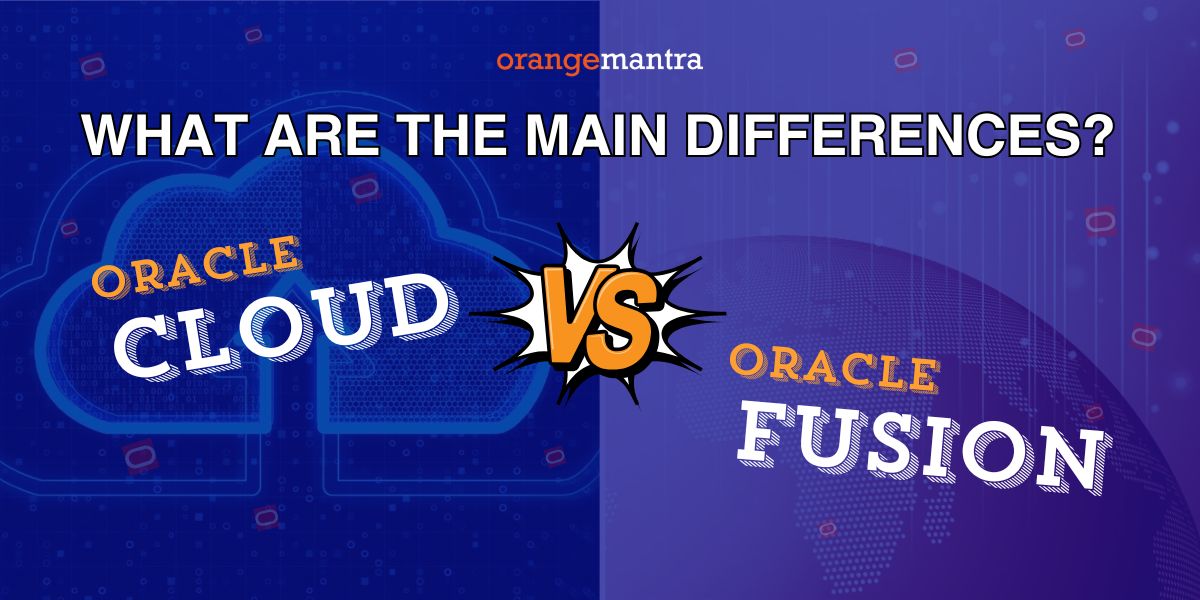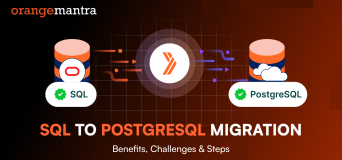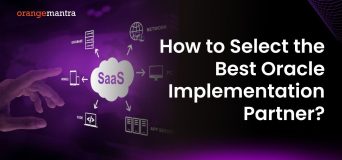
Here’s what you will learn:
Undoubtedly! Businesses are chasing robust and scalable cloud-based solutions to streamline their operations while enhancing productivity and managing data effectively. In this scenario, Oracle is the leading technology provider that delivers different cloud solutions with the aim of solving these challenges. Oracle Fusion and Oracle Cloud are the two major flagship offerings. These two are powerful tools for businesses willing to adopt cloud solutions and modernize their digital ecosystem through integrated DevOps services and automation.
Both Oracle Cloud and Oracle Fusion Cloud are specially designed tools to facilitate businesses with digital transformation. However, these provide distinct capabilities, offerings, and implementations. Hence, in this article, we’ll explore the Oracle Cloud vs Oracle Fusion debate to examine its main differences and discuss their benefits. Also, you’ll find the key insights into how businesses can leverage Oracle implementation services and Oracle cloud solutions.
Table of Contents
What is Oracle Cloud?
Oracle Cloud highlights Oracle’s suite of cloud computing services that provide opportunities for businesses to access cloud-based infrastructure, platforms, and software. Oracle Cloud is considered a comprehensive, flexible, and scalable cloud service with a variety of products designed to manage data, execute applications, and automate processes for different industries.
Oracle Cloud is somehow divided into several service categories:
- IaaS: Infrastructure as a Service: This provides computing power, storage, and networking capabilities.
- PaaS: Platform as a Service: This offers platforms for developers to build, test, and deploy applications.
- SaaS: Software as a Service: This includes pre-built apps like ERP (Enterprise Resource Planning), CRM (Customer Relationship Management), and HCM (Human Capital Management).
Oracle Cloud solutions are specially designed solutions that are highly scalable, secured, and cost-effective. These solutions offer support to both small and large businesses to adopt cloud infrastructure.
What is Oracle Fusion Cloud?
Another Oracle suite, Oracle Fusion, consists of ERP and business management software that combines the best possible features of its existing products with modern cloud technologies. This platform consists of comprehensive tools for finance, supply chain management, human resources, procurement, and more. Oracle Fusion creates a unified system for businesses to manage the core business functionality.
While Oracle Cloud offers infrastructure and platform for creating applications and executing workloads, Oracle Fusion is a cloud-based application suite helping businesses to scale the evolving business needs or demands by managing and automating the processes.
Being modular, Oracle Fusion applications can be customized to fit the specific needs of different departments and industries. This solution provides a comprehensive approach to running an enterprise’s operations with a focus on innovation and automation.
What are the Key Differences: Oracle Cloud vs Oracle Fusion Cloud?
Knowing and understanding the differences between Oracle Cloud vs Cloud Fusion is crucial for CIOs, CTOs, and business architects. On knowing these key aspects, they can evaluate modernization and transformation strategies. So, let’s walk through these primary differences in detail:
1. Nature and Function:
Oracle Cloud refers to the underlying cloud platform or infrastructure (IaaS/PaaS). This ensures businesses execute any app, whether designed with Oracle or non-Oracle workloads.
While Oracle Fusion refers to a business applications suite (SaaS), helping businesses to execute Oracle Cloud. This platform also helps to automate and optimize business-based operations.
Therefore, Oracle Cloud is the foundation while Oracle Fusion is the functional business suite built on top.
2. Target Audience:
Oracle Cloud targets IT departments, developers, and system architects willing to modernize infrastructure and manage databases, especially those integrating DevOps services and cloud-native development.
On the other hand, Oracle Fusion aims at business users, especially finance teams, HR professionals, and sales leaders, requiring ready-to-use business apps.
Therefore, businesses willing to modernize their infrastructure or develop new applications then, Oracle cloud solutions is an ideal technology. While if businesses are willing to optimize their business operations, Fusion apps is the perfect go-to.
3. Customization and Control:
By leveraging Oracle Cloud, users or businesses can attain complete control over infrastructure resources. With this platform, businesses can configure environments with deployment of custom code, management of databases, and integration with third-party tools.
While Oracle Fusion applications provide limited customization to preserve upgrade, compatibility, and security. Additionally, they offer configuration options, personalization, and low-code extensions through Oracle Visual Builder.
For businesses chasing flexibility with deep customization, Oracle Cloud provides more control. However, for rapid deployment with minimal IT dependency, Fusion Apps are significant.
4. Deployment and Scalability:
Oracle Cloud provides higher flexibility in deployment, especially in private, public, and hybrid cloud models. This also helps with automatic scaling, redundancy, and global availability.
While Oracle Fusion apps are SaaS-based and are somehow hosted entirely on Oracle Cloud Infrastructure. Although both platforms are scalable, Oracle Cloud provides more control over infrastructure scaling while Fusion tackles scalability internally as part of the SaaS model.
5. Integration Capabilities:
Oracle Cloud is known for its powerful integration services, including Oracle Integration Cloud, Oracle Data Integration, and support for REST/SOAP APIs.
While Oracle Fusion supports native integrations between modules (ERP, HCM, SCM, and so on). This platform has a tendency to connect with external systems using Oracle Integration Cloud.
So, for businesses willing to plan complex integrations across multiple systems, Oracle Implementation Services can assist you to strategize and execute smoothly.
6. Licensing and Pricing:
Oracle Cloud provides a consumption-based pricing model, like pay-as-you-go or monthly subscription, based on services being used (compute, storage, DB).
On the other hand, Oracle Fusion provides per-user subscription pricing model based on modules selected (like Fusion ERP and Fusion HCM).
What are the Key Benefits: Oracle Cloud vs Oracle Fusion?
After knowing and understanding some key aspects of Oracle Cloud vs Oracle Fusion, let’s walk thoroughly through the different advantages of these solutions:
Oracle Cloud Solutions:
- Greater flexibility with control over infrastructure
- Broad range of services under IaaS, PaaS, and emerging tech (AI, ML, IoT)
- Multi-cloud and hybrid-cloud capabilities
- Ideal for businesses building apps or migrating legacy systems
Oracle Fusion Applications:
- Fully managed but cloud-native SaaS applications
- Faster time-to-value with minimal setup
- Unified UI and data model across business functions
- Embedded AI and analytics for real-time insights
Which one should businesses adopt: Oracle Cloud vs Oracle Fusion?
Let’s walk through some ways to decide among Cloud Suite, which one is the ideal platform:
| BUSINESS NEEDS | RECOMMENDED ORACLE PRODUCT |
| Infrastructure modernization | Oracle Cloud (IaaS, PaaS) |
| SaaS-based ERP, HCM, CRM | Oracle Fusion (SaaS Applications) |
| Application development or hosting | Oracle Cloud Platform Services |
| Unified financial and HR solutions | Oracle Fusion ERP and HCM |
| Enterprise-wide analytics | Oracle Cloud Analytics or Fusion Analytics |
| Custom integrations and APIs | Oracle Cloud and Integration Cloud |
How to Hire Oracle Developers for Successful Implementation?
Now, we have gone through different aspects of Oracle Cloud vs Oracle Fusion, so one of the major steps in adopting Oracle solutions is to hire Oracle developers having the right expertise and skills. These Oracle developers specialize in implementing and customizing Oracle cloud solutions and applications. This ensures that businesses can seamlessly integrate Oracle products into existing systems or workflows.
Now, hiring Oracle Developers can add significant value to a business by:
- Ensuring proper integration between Oracle solutions and existing infrastructure.
- Customizing applications to meet business-specific needs.
- Optimizing cloud performance and minimizing downtime during the transition.
-
Therefore, hiring skilled Oracle developers can help businesses with a smooth and successful deployment of Oracle Cloud or Oracle Fusion. This allows them to leverage the complete power of Oracle’s enterprise solutions.
Also Read: How to Select the Best Oracle Implementation Partner?
Conclusion
On comparing Oracle Cloud vs Oracle Fusion, we can conclude by saying both platforms provide immersive value to businesses but serve different purposes. Oracle Cloud is designed for businesses looking for flexible, scalable cloud infrastructure, while Oracle Fusion focuses on delivering a comprehensive suite of business applications for large enterprises.
Irrespective of the platform you choose, leveraging Oracle implementation services and working with some skilled Oracle developers, businesses can enjoy a smooth transition to the cloud with an optimized digital transformation journey.
Both Oracle products provide excellent capabilities for businesses aiming to remain competitive in an increasingly digital world, and selecting the right solution is key to long-term success.



